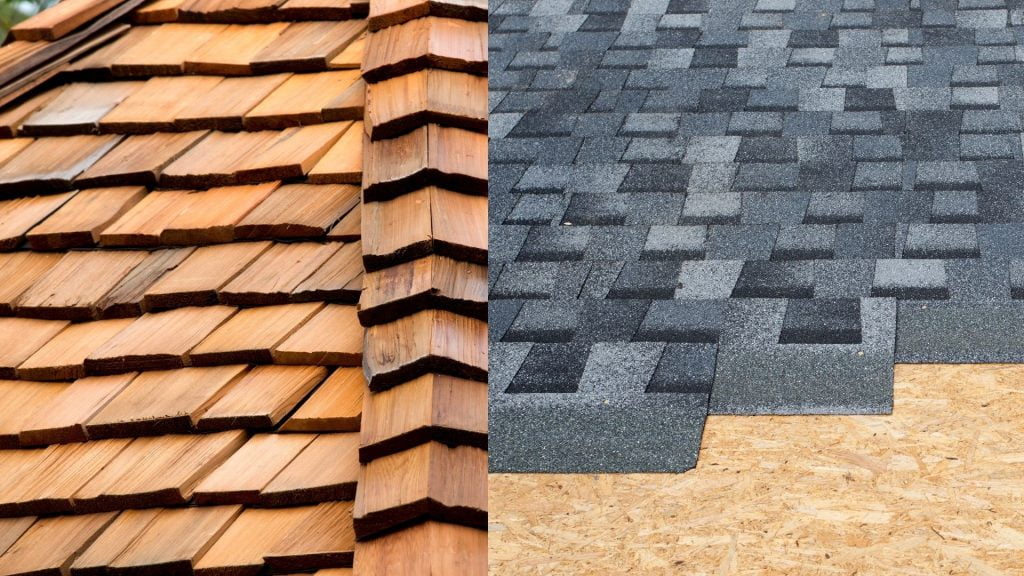Choosing the right roofing material is a significant decision for homeowners, impacting not only the aesthetics of their homes but also the durability and maintenance requirements of the roof. If you currently have a cedar roof and are considering a switch to asphalt, it’s important to weigh the pros and cons to determine if a cedar-to-asphalt conversion is the right choice for your roof. In this guide, we’ll explore the factors to consider, the benefits of each material, and the process of converting from cedar to asphalt.
Understanding Cedar Roofing:
Natural Beauty:
Cedar roofing is renowned for its natural beauty and rustic charm. The warm tones and distinctive grain patterns of cedar shingles or shakes can enhance the curb appeal of a home, providing a timeless and classic look.
Durability:
Cedar is a durable wood that contains natural oils, making it resistant to insect infestations and decay. Properly maintained cedar roofs can have a long lifespan, with some reaching 30 years or more.
Insulation Properties:
Cedar offers natural insulation, helping regulate temperature and potentially reducing energy costs. The insulating properties of cedar can contribute to a more energy-efficient home.
Environmental Considerations:
Cedar is a sustainable and renewable resource, and the production of cedar roofing materials typically has a lower environmental impact compared to some other roofing options.
Reasons for Considering a Cedar-to-Asphalt Conversion:
Maintenance Demands:
While cedar roofing is durable, it requires regular maintenance to preserve its appearance and performance. Cedar roofs may need periodic cleaning, sealing, and replacement of damaged shingles, which can be labor-intensive and costly.
Cost Considerations:
Asphalt roofing is often more budget-friendly than cedar roofing. If you are looking for a cost-effective option without compromising on durability, asphalt shingles can be an attractive alternative.
Longevity:
While cedar roofs can have a long lifespan, they may not be as resistant to the elements as asphalt. In areas with frequent exposure to harsh weather conditions, asphalt shingles may provide better longevity and performance.
Aesthetic Preferences:
Homeowners may consider a cedar-to-asphalt conversion to achieve a different aesthetic. Asphalt shingles come in a variety of styles and colors, offering versatility in design choices.
Fire Resistance:
Asphalt shingles are inherently more fire-resistant than cedar, which is a crucial consideration in areas prone to wildfires. Some asphalt shingles have fire ratings that enhance the overall safety of a home.
Benefits of Asphalt Shingles:
Cost-Effectiveness:
Asphalt shingles are generally more affordable than cedar, making them a popular choice for homeowners looking for a budget-friendly roofing option.
Low Maintenance:
Asphalt shingles require minimal maintenance compared to cedar. They are resistant to rot, insects, and mold, reducing the need for regular inspections and treatments.
Wide Range of Styles:
Asphalt shingles come in a variety of styles, including architectural shingles, three-tab shingles, and designer shingles. This diversity allows homeowners to choose a style that complements their home’s architecture.
Ease of Installation:
Asphalt shingles are lightweight and easy to install, which can result in lower labor costs during the installation process. The ease of installation also contributes to quicker project completion.
Fire Resistance:
Asphalt shingles have a higher fire resistance compared to cedar. Many asphalt shingles are designed to meet or exceed fire safety standards, providing an added layer of protection for homes.
Factors to Consider Before Conversion:
Architectural Style:
Consider the architectural style of your home. While asphalt shingles offer versatility, it’s essential to choose a style that complements the design and character of your property.
Local Climate:
Assess the climate of your location. Asphalt shingles are suitable for various climates, but factors such as wind, rain, and snow should be considered when selecting the specific type of asphalt shingle.
Resale Value:
Evaluate the potential impact on the resale value of your home. While asphalt shingles are popular and widely accepted, some homeowners may place a premium on the natural beauty of cedar.
Environmental Impact:
Consider the environmental impact of both materials. While cedar is a natural and renewable resource, asphalt shingles can be recycled, and some manufacturers offer eco-friendly options.
Budget Constraints:
Assess your budget constraints and long-term financial goals. Asphalt shingles may provide a cost-effective solution, but it’s crucial to balance upfront costs with long-term considerations.
The Conversion Process:
Roof Inspection:
Begin with a comprehensive inspection of your existing cedar roof. Identify any areas of damage, rot, or wear that may need attention.
Removal of Cedar Shingles:
The conversion process typically involves removing the cedar shingles. This step may uncover any underlying issues with the roof deck that need to be addressed.
Roof Deck Inspection and Repair:
Inspect the roof deck for any signs of damage or weakness. Replace or repair any damaged sections to ensure a solid foundation for the new roofing material.
Installation of Asphalt Shingles:
Once the roof deck is prepared, install the selected asphalt shingles following industry best practices. Ensure proper ventilation and insulation during the installation process.
Clean-Up and Inspection:
After the installation is complete, conduct a thorough clean-up of the worksite. Perform a final inspection to ensure the asphalt shingles are installed correctly and meet quality standards.
Conclusion:
Deciding to convert from cedar to asphalt is a personal choice that involves weighing various factors, including aesthetics, budget, and long-term maintenance. While cedar roofing offers natural beauty and a sustainable appeal, asphalt shingles provide cost-effectiveness, low maintenance, and a wide range of design options. Before making a decision, consult with roofing professionals to assess the condition of your current roof, understand the specific requirements of your location, and explore the benefits of both materials. A-Top Roofing Ltd. is here to assist you in making an informed choice and providing expert installation services. Contact us at 778-874-0421 or [email protected] to discuss your roofing needs and explore whether a cedar-to-asphalt conversion is the right solution for your home.

